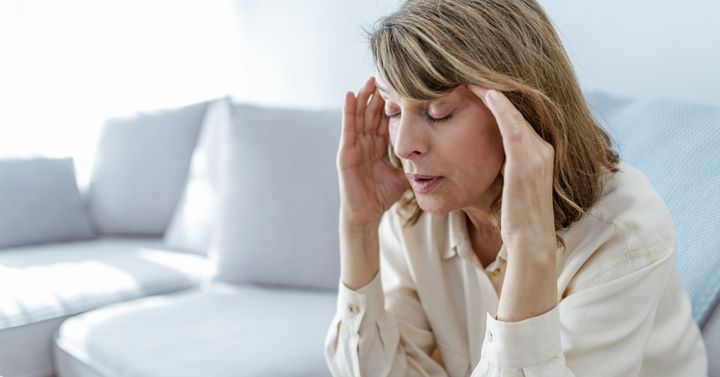Menopause is a natural stage in a woman's life that brings with it a series of physiological and hormonal changes. One of the least talked about symptoms, but one that affects many women, is excessive sleepiness. Daytime sleepiness can interfere with daily routines, affecting work performance, concentration, and mood.
If you feel exhausted, with uncontrollable sleepiness during the day and no energy to tackle your activities, we want you to know that you are not alone. In this article, we will explain why this sleep disorder occurs during menopause and give you practical solutions to mitigate it.
Menopause and sleep: how to regain your energy
Sleep plays a fundamental role in health and well-being. However, during menopause, many women experience changes in their sleep patterns, which can lead to a constant feeling of tiredness. To better understand this condition, it is important to know the stages of sleep and how menopause influences them.
Sleep stages and menopause:
Sleep is divided into several stages: light sleep, deep sleep, and REM sleep. During menopause, oestrogen and progesterone levels decrease, which can cause frequent night-time awakenings and make it difficult to transition between these stages.
Furthermore, according to medical studies, hormonal changes directly affect the production of melatonin, the hormone responsible for regulating the sleep cycle, which can contribute to poor sleep quality. According to the Instituto del Sueño, menopausal women may experience difficulty reaching deep sleep, which causes early awakenings and difficulty falling asleep.
Impact of changes in sleep patterns
When you don't get enough rest at night or your sleep is constantly interrupted, your body tries to compensate during the day (what we call daytime sleepiness), creating a vicious cycle.
Likewise, lack of sleep can also affect metabolism, emotional balance and cognitive ability, which explains why many women experience difficulty concentrating or remembering information.
Most common symptoms
It is normal to feel fatigued during menopause. However, it is important to identify what changes may occur in order to alleviate them, such as:
Excessive daytime sleepiness:
Also known as hypersomnia, this is one of the most troublesome symptoms of the menopause. It can manifest itself as an overwhelming need to sleep during the day, difficulty concentrating and a feeling of constant lethargy.
Chronic fatigue and low energy:
Many menopausal women also experience chronic fatigue, which means feeling exhausted even after sleeping. This symptom may be accompanied by demotivation, apathy, irritability, and mood swings.
How to remedy excessive sleepiness
Although excessive sleep during menopause can be frustrating, it is important to remember that there are effective solutions.
With a few changes to your daily routine, a balanced diet, and the right support, it is possible to regain your energy and improve your quality of life. You are not alone in this process, and with the right strategies, you can feel more active again.
Healthy eating and habits
Diet directly influences sleep quality and energy levels. To combat daytime sleepiness, it is advisable to include:
• Iron-rich foods such as spinach, lentils and tofu to prevent fatigue.
• Lean proteins such as chicken, fish or eggs, which help stabilise energy levels.
• Avoid heavy meals at night, as they can interfere with sleep quality.
Natural supplements
Supplements can be a key tool for restoring energy and improving sleep quality, providing the body with essential nutrients that promote restful sleep and reduce feelings of daytime fatigue.
Our Vita Zen Triptófano formula has been designed by and for women with demanding daily lives. Its ingredients have been selected to work in synergy, providing well-being and energy to cope with all the rhythms of life.
Physical exercise
Let's not forget that exercise is essential for regulating your circadian rhythm and increasing your energy levels. If you find it difficult to incorporate exercise into your daily routine, it's best to start slowly and adapt it to your pace. Some recommended options are:
• Daily walks to boost your metabolism.
• Yoga and Pilates, which help reduce stress and improve sleep quality.
• Strength training, which can improve physical endurance and combat fatigue.
Medical treatmen
In some cases, it may be necessary to see a doctor to assess whether specific treatment is appropriate to help stabilise hormone levels and improve sleep quality, thereby reducing daytime sleepiness.
A healthcare professional will be able to recommend personalised options based on each patient's medical history and needs.
Consult a professional
Although following these tips can make a big difference in sleep quality and energy levels, every woman is different, and what works for one person may not be enough for another.
If daytime sleepiness or fatigue persists and affects your quality of life, it is best to see a healthcare professional. A specialist will be able to assess your situation comprehensively and individually and recommend the most appropriate treatment to help you regain your well-being.
FAQ
Does excessive sleep affect memory?
Yes, lack of restorative sleep can affect memory and concentration, making it harder to recall information and perform daily tasks efficiently.
Does stress worsen my sleep quality?
Absolutely. Chronic stress raises cortisol levels, which can make it difficult to fall asleep and cause frequent nighttime awakenings.
During menopause, can I develop a lack of concentration?
Yes, it is common for many women to experience difficulties concentrating due to hormonal changes and inadequate rest.
Sources:
Fases del sueño: https://www.clinicbarcelona.org/asistencia/vida-saludable/dormir-bien/fases-del-sueno
Proteínas magras: https://cncsalud.com/top-de-proteinas-magras/
Alimentos con hierro: https://medlineplus.gov/spanish/ency/article/002422.htm


/assets/orissens/logo_black.png)
/1200x900/categories/e5ab714cec96318818ebb280ebb44565/articulaciones-67c5c282bfd987.68705266.png)
/1200x900/categories/e5ab714cec96318818ebb280ebb44565/circulatorio-67acfbaa816393.75945444.png)
/1200x900/categories/e5ab714cec96318818ebb280ebb44565/defensas-respiratorio-67acfd555def67.16060958.png)
/1200x900/categories/e5ab714cec96318818ebb280ebb44565/silueta-67acfdd91a9032.04521369.png)
/1200x900/categories/e5ab714cec96318818ebb280ebb44565/salud-hormonal-67acfd9fed13a1.58527156.png)
/1200x900/categories/e5ab714cec96318818ebb280ebb44565/salud-intima-67acfdb21a7d82.06710308.png)
/1200x900/categories/e5ab714cec96318818ebb280ebb44565/energia-fisica-mental-67acfd7b28eb35.87929128.png)
/1200x900/categories/e5ab714cec96318818ebb280ebb44565/sueno-relax-67acfdec6cc222.29822928.png)
/1200x900/categories/e5ab714cec96318818ebb280ebb44565/salud-urinaria-67acfdc3722a44.05094273.png)